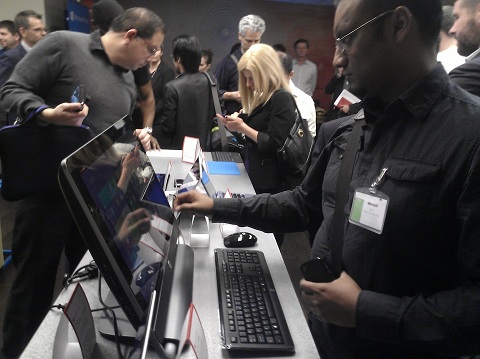Calling the existing smart phone interface model “a tired old metaphor,” Microsoft Corp. vice-president Joe Belfiore launched the Windows Phone 8 operating system on Monday at a press event in San Francisco. San Francisco was good timing, with the city coming off a World Series sweep by the Giants, while Google Inc. had to cancel an Android tablet launch in New York City (recently vacated by the Microsoft promotional machine after Windows 8 and Surface tablet launches) due to Hurricane Sandy.

Press and analysts check out Windows 8 devices at the launch of Windows Phone 8 in Toronto
Other smart phones are app-centric, argued Belfiore, while Windows Phone 8 focuses on people and relationships. Microsoft’s launch mantra: Not a smart phone for all of us, but a smart phone for each of us. “It’s the most personal smart phone operating system you can get,” Belfiore said.
And it is remarkably customizable, giving users the option to “pin” apps and even contacts to the start page. It’s a few steps beyond Windows Phone 7 in customizability, and some beyond it in functionality — it’s based on the same operating system that Windows 8 laptops and desktops run on.
RELATED CONTENT
IT has little interest in Windows 8: Analyst
Phone 7 was the first mobile operating system from Microsoft worth feeding, and, in fact, very competitive with Android and the iPhone in terms of user experience. I’d even call Phone 7 a prototype for the whole Windows 8 ecosystem, the platform that supports PCs, laptops, tablets, phones, and even gaming consoles.
It’s an ecosystem in a very different way than Apple’s ecosystem built around iOS. Apple’s ecosystem is based on transactions; the company manages to insinuate itself into every purchase, app, movie or music, that its users make. Microsoft’s is an ecosystem of devices built around its Hotmail and SkyDrive services. You can start a task on any device and pick up the task on another device, synching through the SkyDrive cloud storage offering. That’s a compelling enterprise play, especially combined with enterprise-specific features like encryption, management, line-of-business application installation and corporate hubs. (The launch was skimpy on the enterprise details, but, hey, this was a consumer gig.)
Phone 8 should appeal to IT departments who, faced with the BYOD onslaught, want tighter manageability and better integration of devices. The question is, do IT departments have that kind of control anymore, or has the BYOD train left the station?